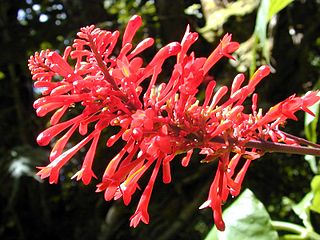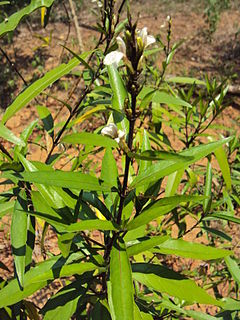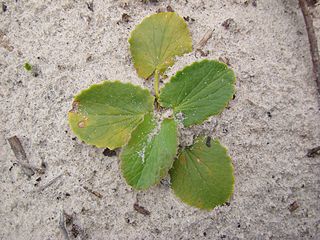
Justicia brandegeeana, the Mexican shrimp plant, shrimp plant or false hop, is an evergreen shrub in the genus Justicia of the acanthus family Acanthaceae, native to Mexico, and also naturalized in Florida.

Acanthaceae is a family of dicotyledonous flowering plants containing almost 250 genera and about 2500 species. Most are tropical herbs, shrubs, or twining vines; some are epiphytes. Only a few species are distributed in temperate regions. The four main centres of distribution are Indonesia and Malaysia, Africa, Brazil, and Central America. Representatives of the family can be found in nearly every habitat, including dense or open forests, scrublands, wet fields and valleys, sea coast and marine areas, swamps, and mangrove forests.

Justicia is a genus of flowering plants in the family Acanthaceae. It is the largest genus within the family, encompassing around 700 species with hundreds more as yet unresolved. They are native to tropical to warm temperate regions of the Americas, India and Africa. The genus serves as host to many butterfly species, such as Anartia fatima. Common names include water-willow and shrimp plant, the latter from the inflorescences, which resemble a shrimp in some species. The generic name honours Scottish horticulturist James Justice (1698–1763). They are closely related to Pachystachys.

Club Social y Deportivo Defensa y Justicia, commonly known as Defensa y Justicia or simply Defensa, is an Argentine football club from Florencio Varela, Buenos Aires. The team currently plays in the Primera División, the top division of the Argentine football league system. Home games are played at the Estadio Norberto "Tito" Tomaghello which has a capacity of approximately 18,000.

Justicia floribunda is a species of flowering plant in the acanthus family Acanthaceae, native to Brazil.

Justicia adhatoda, commonly known in English as Malabar nut, adulsa, adhatoda, vasa, vasaka,, ,, (Tamil:ஆடாதொடை), (Gujarati:અરડૂસી), (Hindi:अडूसा),, is a medicinal plant native to Asia, widely used in traditional medicine.

Justicia americana, the American water-willow, is a herbaceous, aquatic flowering plant in the family Acanthaceae native to North America. It is the hardiest species in the genus Justicia, the other members of which being largely tropical and subtropical, and it is able to survive as far north as USDA zone 4. It is common throughout its range.

Justicia californica is a species of flowering shrub native to the deserts of southern California, Arizona, and northern Mexico. Its common names include chuparosa, hummingbird bush, and beloperone.

Justicia pectoralis is an herb in the family Acanthaceae. This water-willow is widely known as tilo in Latin America and in Cuba. In Haiti it is called chapantye and zeb chapantyè on Dominica and Martinique. Other folk names are freshcut, chambácarpintero ("carpenter"), té criollo, curia, death-angel, masha-hari, or "piri piri". This species was described by Nikolaus Joseph von Jacquin in 1760, who provided additional data in 1763. A well-marked variety, var. stenophylla, was described by Emery Clarence Leonard in 1958.

Justicia spicigera is an evergreen shrub with tubular orange flowers. The species is native to Belize, Costa Rica, El Salvador, Guatemala, Honduras, Mexico and Nicaragua.
Justicia flaviflora is a species of herbaceous plant in the family Acanthaceae. It was previously classified as Beloperone flaviflora. The species is endemic to the island of Trinidad in the Caribbean republic of Trinidad and Tobago where it is only known from near the peaks of mountains in the Northern Range. It is an erect herb with leaves up to 27 cm (11 in) long. It is suffering from habitat degradation and has become increasingly rare, being now rated as "critically endangered".
Justicia tobagensis is a species of plant in the family Acanthaceae which is endemic to Trinidad and Tobago. The species is only known from two areas in the Main Ridge of Tobago. It was first described as Drejerella tobagensis by German botanist Ignatz Urban in his Symbolae Antillanae, based on a collection made by Danish botanist Henrik von Eggers

Justicia gendarussa, commonly known as willow-leaved justicia, is a small erect, branched shrub. It has been described as rare and endemic to India, though those claims are at least confusing, in the context of statements that the plant is widely used in various forms for many of its medicinal and insecticidal properties, and that it is a quick-growing, evergreen forest shrub considered to be a native of China and distributed in Sri Lanka, India and Malaysia. J. Gendarussa is harvested for its leaves for the treatment of various ailments. In addition, certain extracts from its stem show antibacterial activity and could also be a potent antifungal agent against certain fungi.

Justicia carnea, the Brazilian plume flower, Brazilian-plume, flamingo flower, or jacobinia, is a flowering plant in the family Acanthaceae.

Ch. Surender Singh Memorial Herbal Park, Kairu is a herbal and medicinal plant park in Kairu village between the cities of Bahal and Bhiwani in the Tosham tehsil of the Indian state of Haryana. It is also the location of a Chinkara Breeding Centre run by the Forests Department of the state government.

The Shatavar Vatika Herbal Park, Hisar, named after the shatavar herb, is a 125-acre herbal park for the conservation of several endangered ayurvedic medicinal herbs. It is located on Hisar-Dhansu road, which runs off 'Hisar-Barwala NH-52', in Hisar city of Haryana state in India.

Ch. Surender Singh Memorial Herbal Park, Tosham is a herbal and medicinal plants park in Tosham town of Bhiwani district in the Indian state of Haryana.

The Ministry of Justice and Human Rights of Argentina is a ministry of the national executive power tasked with enforcing of the law and administration of justice and upholding human rights.















